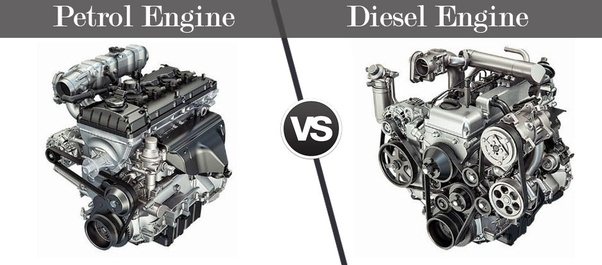Dreaming about exactly how you’re going to deck out your van? Imagining wooden cabinets, handy under-bed storage, and a cute little sink is a fun part of planning for living life on the road, but while you’re actually on the road, what’s going to be powering your adventures? The choice between a gas and a diesel engine is an important one.
Gas engines are better than diesel for most van lifers. They’re cheaper, use easy-to-find fuel, are less costly and more convenient to repair, and are easier on the environment. For those who need to tow heavy loads or whose main concern is engine longevity, diesel makes a great alternative.
In this article, you will learn more about the pros and cons of gas and diesel engines. We will also compare cost, towing capacity, reliability, and environmental impact, and learn why fuel costs are, surprisingly, not much of a factor in deciding between gas and diesel.

Engine Cost

Gas engines are less expensive than diesel engines, often by thousands of dollars. Diesel lovers will point out that diesel vehicles hold their value better than gas-powered vehicles. They claim that the higher resale value makes diesel a better long-term investment despite the higher initial cost. What this fails to take into account, though, is that there is a difference between the money you have now and the money you will get in the future.
You have the option of investing money you have now in a number of ways. You could invest in a diesel engine—and best-case scenario, resell your van for exactly what you paid for it, which would be zero gain, but not zero loss because those future dollars will be worthless due to inflation. Or, you could buy the gas engine and invest the extra money in some other way, potentially with a better return.
And, of course, there’s no guarantee about what the eventual resale value of your diesel van will be, so like nearly all investments, it’s a risk to take into account.
Longevity
Diesel is the clear champion here because in the way that diesel burns, through compression ignition, an engine that runs on it needs to be more ruggedly constructed. This is one reason that diesel engines can last up to a third longer than gas engines. Another reason is that diesel engines use fewer revolutions per minute, causing less wear over time.

If you’re planning to drive an unusually high number of miles, especially if those miles will be on the highway, or if you’re planning to keep your van until the engine wears out, a diesel engine might make sense for you.
Towing Capacity
Diesel engines are superior at towing heavy loads. This is because their engines create more torque. Better torque will not only give you better towing capacity, but it will also make it easier on your engine if you do a lot of driving in hilly areas.
If you need to be able to tow behind your van or do a lot of driving in hilly areas, diesel really might be a smart choice. But for people who don’t tow and travel mostly in ordinary terrain, a gas engine will absolutely get the job done.
If you’re not sure how much engine you’ll need for towing, have a look at this helpful video:
Fuel Cost and Availability
Gas is cheaper than diesel (usually by about 20%), but diesel engines get better mileage (usually by about 20%). How do you figure out which one gives you the better value per mile, then? Use the equation:
fuel cost (distance/fuel efficiency)
For example, if a gas engine gets 15 miles per gallon (6.4 km per liter), you want to take it 170 miles (274 km), and gas is selling at $3.02 per gallon ($.80 per liter), gas for your trip would cost you $34:
3.02 (170/15) = 34
If a diesel engine would give you 18 miles per gallon (7.7 km per liter) and diesel is selling for $3.62 per gallon ($.96 per liter), the trip would still cost you $34.
3.63 (170/18) = 34
In general, unless there is a large spike in the cost of one or the other fuel, a diesel-powered trip will cost you about the same as a gas-powered trip.
Diesel is not as readily available in some places; however, so choosing diesel can mean driving a bit out of your way to fuel up. This could add time and expense to your trip.
Reliability and Repairs

One problem with diesel is that both engine parts and mechanics who work on diesel engines can be harder to find. The engine parts are also expensive. This makes repairs to a diesel engine significantly more costly. Those sturdier parts that make the diesel engine long-lived come with a price disadvantage when one or more need replacing.
Diesel engines may also need repair and routine maintenance more frequently than gasoline engines, although this point has been disputed. When your vehicle is also your home, frequency, and availability of repairs matters a lot—so this is a point you would want to research carefully for the specific vehicle you’re interested in.
Regardless of the frequency of repairs, the cost issue is still a serious drawback. Some diesel engine repairs are so costly, in fact, that you could buy a new gasoline engine for the same price. This makes the longevity of a diesel engine less attractive: you can run a gas engine until it’s worn out and then put in a second, brand new engine for what it would cost you to repair diesel fuel injectors alone.
If you’re handy with cars, you might consider getting a copy of Diesel Technology Eighth Edition or Troubleshooting and Repairing Diesel Engines, 5th Edition, and learning to work on your diesel engine yourself to offset some of the cost of repairs.
Or check out this handy video series on the same topic–start with the first video, and if it’s helpful, you can view the rest of the series:
Environmental Impact
Because diesel emissions have been linked to cancer and heart and respiratory health problems, and because they contribute significantly to the pollution of water, soil, and air, governments have put strict standards in place. In the U.S., for instance, diesel vehicles must run on ultra-low-sulphur fuel. This isn’t widely available in some places you might want to travel, such as Mexico, so you’ll struggle to fuel your diesel vehicle there.

This is not to say that gas doesn’t negatively impact the environment. It does, but research shows that diesel is worse. If the environmental impact of what you drive matters to you, consider that although diesel engines have improved over the years, their effect on the environment is still a serious concern.
Summary
Both gasoline and diesel vehicles have attractive qualities, and diesel might be a better alternative for van owners who plan to rack up a lot of highway miles, often drive in hilly terrain, or use their van for towing. Outside of these scenarios, though, gas engines are the better choice. They’re cleaner, easier to maintain, easier to fuel, and cheaper. For the majority of van lifers, these benefits outweigh the benefits of diesel.
Want to learn more? Here are two more videos to check out:
Gas vs. diesel engines are the subject of this Ultra Mobility video:
The major differences between gas and diesel engines are explored here:
